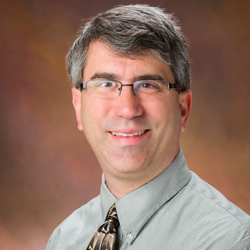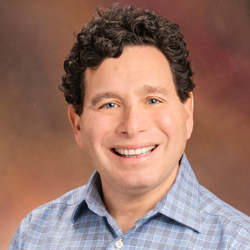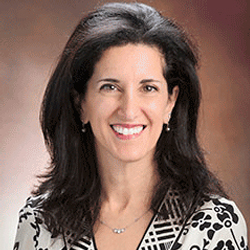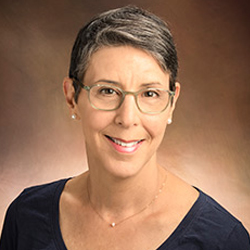HOW CAN WE HELP YOU? Call 1-800-TRY-CHOP
In This Section
Four CHOP Docs Receive 2019 Perelman School of Medicine Teaching Awards
 By Nancy McCann
By Nancy McCann
It’s Teacher Appreciation Week, and we’re taking our big thinking-caps off to four teachers of excellence honored by the Perelman School of Medicine at the University of Pennsylvania. A total of 18 professors with a penchant for pedagogy were selected for the 2019 teaching awards, and four of the honorees share their talents with Children’s Hospital of Philadelphia and its Research Institute:
- The Leonard Berwick Memorial Teaching Award: Edward Behrens, MD
Established in 1980-1981, as a memorial to Leonard Berwick by his family and the Department of Pathology, this award recognizes “a member of the medical faculty who in his or her teaching effectively fuses basic science and clinical medicine.” - The Scott Mackler Award for Excellence in Substance Abuse Teaching: Joel Fein, MD, MPH
Established in 2000 by the Penn/VA Center for Studies of Addiction and the Department of Psychiatry, this award is named for Dr. Mackler, who was known for his excellence in teaching medical students, residents, postdoctoral fellows, nurses, and other Penn faculty in the area of substance abuse. - Dean’s Award for Excellence in Clinical Teaching: Meryl Cohen, MD
Established in 1987, this award recognizes clinical teaching excellence and commitment to medical education by outstanding faculty members from affiliated hospitals. - The Robert Dunning Dripps Memorial Award for Excellence in Graduate Medical Education: Lisa Zaoutis, MD
Established by the Department of Anesthesia in 1983-1984, this award recognizes excellence as an educator of residents and fellows in clinical care, research, teaching, or administration.
Edward Behrens, MD

Edward Behrens, MD, chief of the Division of Rheumatology, Joseph Lee Hollander Chair in Pediatric Rheumatology at CHOP, and associate professor of Pediatrics
Interacting with the next generation of learners is an incredibly meaningful way to propagate the advancement of medical science for current patients as well as for all of the patients yet to come. Illustrating how the basic sciences can inform clinical care for patients, particularly for those who fall between the cracks of our refined existing pathways and algorithms, helps trainees at all levels reconnect with the roots of medical education in a significant way.
For me, teaching is not just the transmission of factoids from one mind to another, but mentoring trainees to develop their own set of tools to rigorously investigate and discover new truths. This is how we move forward our capacity to effectively care for those for whom we have no answers today, but for whom we provide hope for a better future.
Teaching the outstanding trainees at CHOP and Penn encourages me to be become a better physician-scientist, as the questions they often ask are not biased by preconception, and therefore are often the most insightful and provocative. This has, on more than one occasion, led to entirely new research directions and important new insights. I look forward to continuing to have the privilege of interacting with these fantastic young minds.
Joel Fein, MD, MPH

Joel Fein, MD, MPH, director of Advocacy and Health Policy in the Emergency Department, advocacy advisor for Government Affairs at CHOP, and professor of Pediatrics and Emergency Medicine
Having been raised at CHOP, I was faced with constant examples of what kind of educator I wanted to be “when I grew up.” Bedside teaching, although more haphazard and difficult to complete in a chaotic, busy clinical environment, gives me the most satisfaction.
What I learned from my mentors, and realized I enjoy the most, is how to teach students to organize their thoughts around a clinical presentation or chief complaint. Factoids are important, but critical thinking is, well, critical. Not only are we exchanging clinical information but, more importantly, are able to teach communication style, listening skills, and how to actually get the information we need to make a diagnosis and plan — things we cannot get from any book or online resource.
During those one-on-one dialogues in the ED, the teacher and student roles are actually more fluid, and my trainees get to keep me updated on the latest approaches and medical management protocols they are learning from my colleagues elsewhere in the hospital.
I feel similarly about teaching in a research setting — it’s all about how to help someone make their brilliant ideas feasible, digestible, and fundable!
Meryl Cohen, MD

Meryl Cohen, MD, pediatric cardiologist in the Cardiac Center at CHOP, director of the CHOP Cardiology Fellowship Training program, associate chief of the Division of Cardiology, and professor of Cardiology
What I find so rewarding about teaching is seeing your students achieve more than you. I am very proud of my students who have gone on to very successful careers. I often hear myself using pearls that were given to me by my teachers and mentors. We all want to have a legacy in our careers, and for me, that legacy will hopefully be that my teaching will live on in my students.
There is tremendous satisfaction when you see that a student understands a difficult concept or shows great enthusiasm for an interesting clinical case. Some of my favorite interactions with students are in small groups or one-on-one learning. One of the best aspects of teaching is when students challenge and question me. Over my career, it has certainly made me better at what I do.
Lisa Zaoutis, MD

Lisa Zaoutis, MD, attending physician at CHOP and associate professor of Clinical Pediatrics
There are several ways that learners make me a better physician. First, learners motivate me to stay on top of the advances that are a near constant in the fast-paced world of medicine. Each learner, eager to push their own learning edge within their chosen domain, nudges me to try to stay a half-step ahead of them. Since I get to work with such a broad range of learners, each one stretches me in a slightly different area, helping to keep me vibrant and relevant across a wide spectrum.
Second, their presence makes me delightfully self-conscious, or should I say, self-aware. Any confusion I see on their faces forces me to break down my own understanding more carefully and more thoroughly. Any pushback they offer helps me reconsider my position and adjust it when appropriate. Complacency is not an option when you have bright learners challenging your knowledge, your logic, and your perspective.
Lastly, there is an undeniable joy in sharing my passion with motivated and receptive learners. The rewards of my efforts feel magnified and multiplied. It is a veritable burnout antidote.